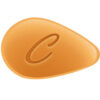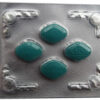Active Ingredient Details
Levitra contains the active ingredient vardenafil, a phosphodiesterase type 5 (PDE5) inhibitor. This active component works by increasing blood flow to the penis, supporting the erection process during sexual stimulation. Vardenafil is a selective inhibitor that interacts specifically with PDE5, found primarily in penile tissue.
Mechanism of Action
Vardenafil operates by inhibiting the action of the PDE5 enzyme, which is responsible for the degradation of cyclic guanosine monophosphate (cGMP) in the corpus cavernosum. During sexual arousal, nitric oxide is released, activating the enzyme guanylate cyclase. This results in elevated cGMP levels, facilitating smooth muscle relaxation and increased blood flow, culminating in an erection.
Indications for Use
Levitra is primarily indicated for erectile dysfunction in adult males, enhancing erectile response capabilities. It is intended for use only when sexual activity is anticipated. The medication is effective in a variety of pathophysiological etiologies of erectile dysfunction, including diabetes or post-prostatectomy conditions.
Recommended Dosage and Administration
The usual starting dose of Levitra is 10 mg, taken orally approximately 60 minutes before anticipated sexual activity. The dosage may be adjusted based on efficacy and tolerability, either increasing to a maximum of 20 mg or reducing to 5 mg. Levitra can be taken with or without food but may have delayed onset if consumed with a high-fat meal.
Potential Drug Interactions
Levitra may interact with medications that inhibit the enzyme CYP3A4, such as ketoconazole and itraconazole, leading to increased vardenafil plasma levels. Concurrent use with nitrates, often prescribed for chest pain, can result in severe hypotension. Alpha-blockers used for hypertension or prostate conditions may also interact adversely, requiring careful monitoring.
Common Side Effects
Patients taking Levitra may experience side effects such as headache, flushing, dyspepsia, and nasal congestion. Visual disturbances, including changes in color perception and blurred vision, can occur. These effects are typically transient and resolve without long-term consequences.
Contraindications and Cautions
Levitra is contraindicated in patients with known hypersensitivity to vardenafil or any excipient in the formulation. Caution is advised for patients with cardiovascular conditions affecting the ability to exert physical activity, as sexual activity increases cardiovascular strain. Additionally, men with anatomical deformation of the penis or a predisposition to priapism should use Levitra cautiously.
Special Population Considerations
For older adults over 65 years, a lower starting dose of 5 mg is recommended due to the increased sensitivity to vardenafil. Caution should be exercised in individuals with moderate renal impairment, as dose adjustments might be needed. In patients with severe hepatic impairment, Levitra is not advised.
Clinical Trials and Efficacy
Clinical trials have demonstrated the efficacy of Levitra, showing significant improvement in erectile function across diverse patient populations. Participants with diabetes and post-prostatectomy patients reported enhanced erectile success. Levitra has shown consistent results in both spontaneous and premeditated sexual activities.
Pharmacokinetics and Metabolism
Levitra is rapidly absorbed, reaching peak plasma concentrations within 60 minutes post-administration. It has an elimination half-life of four to five hours. Vardenafil is metabolized predominantly by hepatic cytochromes CYP3A4, CYP3A5, and CYP2C9, with excretion primarily in feces as metabolites.
Storage and Handling Guidelines
Levitra should be stored at room temperature, in its original packaging to protect from moisture. The medication should be kept out of reach of children and not used beyond its expiry date. Handle tablets with clean, dry hands to maintain integrity and efficacy of the medication.





Reviews
There are no reviews yet.